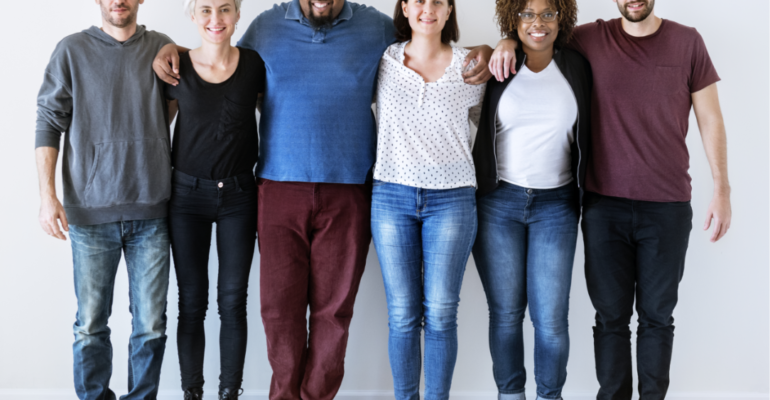7 Ways to a More Meaningful Life
1. Be Happy
Seems obvious right? Yet one of the barriers to happiness is that it is often seen as a self-absorbed, navel gazing, me! me! me! kind of activity. But research finds that this is not correct, demonstrating that happier people often care more about important causes. There’s a belief that we shouldn’t be focused on making people happier or increasing their wellbeing because they won’t be motivated to do anything, but research suggests the opposite. Being happier leads to people taking more action, not less. What can you do – where can you start? Contact Action for Happiness and see if you can enroll on one of their “Exploring What Matters” courses – 8 weeks of talk about happiness – life changing! And Book us to deliver our utterly inspiring “Science of Happiness” workshop/talk – to your workplace or community group. Could be your best hour’s learning for a long time. See our website for more.
2. Diversity helps
Not always immediately, but in the long term. Initially diversity does tend to cause problems. Over time things start to shift in a more positive direction. How much time? In societies/neighbourhoods it appears to be about ten to twelve years. While it appears that societies tend to accept diversity over time, outcomes are heavily dependent on leadership. Leaders who frame outsiders as scary and act to isolate or exclude them are simply prolonging the initial stresses of diversity. And also delaying the benefits. You can start to embrace diversity in others, in your own emotions and in society right now – for a more meaningful life. Look out for our upcoming Blog about Emodiversity.
3. Awe
Awe changes our brains for the better. When experiencing the emotion of awe, people feel less focused on themselves and more connected to the greater world. Awe can transport and transcend us to a different level. We need our WOW moments! Do you need to refresh/reboot your thinking or state of mind? Look at something wonderful, listen to something amazing, taste something delicious, read something inspiring or funny. Wonder at the natural world – the Grand Canyon? Niagara Falls? Ayers Rock? A tree? A view? Or even wonder at something man-made – buildings, roads, bridges, works of art, sculpture. Embrace awe and wow moments – cherish them and savour them!
4. Giving to others is more satisfying.
Compared to treating ourselves, doing something kind for others may give us more enduring satisfaction. We soon get used to a treat for ourselves, but if we are treating others, that joy keeps on going. Happiness from giving to others appears to sustain itself – we’re less likely to get used to it or take it for granted. Be generous – it isn’t always about money – how about a smile? Or more compliments? Or your time? Volunteer?
5. Practice Loving Kindness Meditation
This really helps if you do it daily – and has even been shown to slow ageing! It cultivates warm-hearted positive emotions toward ourselves and others. Strengthening our kindness and social connection can fuel good mental and physical health and even keep us youthful. It also reminds us that we have things in common with everyone else, including our suffering. See this brilliant video which shows you what a wonderful practice this is.
6. Forgive
People who are more forgiving sleep better – and sleep is fundamental to our wellbeing. Adults were asked to rate themselves on how likely they were to a) forgive themselves for things they do wrong and b) forgive others for hurting them. This was compared to their sleep quality, current health, and satisfaction with life. The results suggested that people who were more forgiving were more likely to sleep better and for longer, and have better physical health. They were also more satisfied with life.
When we don’t forgive, we tend to dwell on unpleasant thoughts and feelings. This can involve painful rumination when we go to bed – negative overthinking, focusing on distress, shame, humiliation, pain, unfairness, anger. This resentment or bitterness detracts from our sleep quality and our wellbeing. If you’re holding onto a grudge, forgiveness could be one constructive practice to try. The rewards could be better sleep and better health.
7. The Arts are good for us
For all of us including children. Children reported on their self-esteem, as well as how often they listened to or played music, drew, painted, or made things or read for enjoyment at home. It was found that those who participated in arts activities most days were significantly more likely to have higher levels of self-esteem than those who participated less often. Interestingly, for reading and music, this boost in self-esteem was limited to kids whose parents were involved with them. Kids who did more painting and drawing felt better about themselves whether their parents were involved or not. Importantly, it didn’t matter whether kids were actually good at art or music. At a time when arts in schools are struggling, it’s increasingly clear that some of the best tools we can provide our children may be paintbrushes and musical instruments!
So what will YOU do differently? Maybe choose one or two of the above ideas that you think YOU could incorporate into your life and see what a difference they make. How can they help YOU to Unlock Your Wellbeing?
You can sign up for our monthly newsletter here
Related Tags: Workplace Wellbeing Solutions, Wellbeing Awareness, Mental Health Wellbeing in the Workplace


